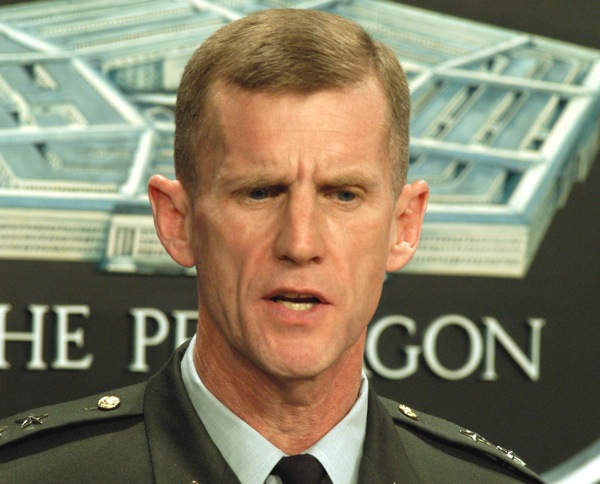Former Interrogator Presses for McChrystal’s Stance on Abuse
A former military interrogator who contributed to the manhunt for a senior Iraqi terrorist has urged the Senate Armed Services Committee staff to question Lt. Gen. Stanley McChrystal on what he knew about detainee abuse committed by troops in Iraq under his command.
Jul 31, 202035.7K Shares549.2K Views
Army Lt. Gen. Stanley McChrystal (defenselink.mil)
A former military interrogator who contributed to the manhunt for a senior Iraqi terrorist has urged the Senate Armed Services Committee staff to press Lt. Gen. Stanley McChrystal, the Obama administration’s nominee to lead U.S. troops in the Afghanistan war, on what he knew about detainee abuse committed by troops in Iraq under his command when McChrystal goes before the panel Tuesday morning for his confirmation hearing.
“Gen. McChrystal, he was there in Iraq often, and he may have been separated from these things by couple layers [of subordinates] but it would’ve been his responsibility to know what was going on,” said Matthew Alexander, the pseudonym of a former Air Force interrogator whose non-coercive interrogations in 2006 helped identify and kill Abu Musab al-Zarqawi, then the leader of al-Qaeda in Iraq.
Illustration by: Matt Mahurin
McChrystal helmedthe Joint Special Operations Command from September 2003 until August 2008. From 2004 until 2006, an elite Special Operations-led task force, known eventually as Task Force 6-26, hunted Zarqawi and other high-valued terrorists in Iraq, and in the course of attempting to extract intelligence from detainees it acquired in that pursuit, some task force members were found to employ abusive interrogation techniques and even cruel treatment outside the interrogation chambers. In June 2004, the head of the Defense Intelligence Agency, Vice Adm. Lowell Jacoby, wroteto the top Pentagon intelligence official that Task Force 6-26 would send detainees to a temporary Baghdad holding facility “with burn marks on their backs,” and one of his interrogators “witnessed TF 6-26 officers punch a prisoner in the face to the point the individual needed medical attention.” According to a report by Human Rights Watch in 2006, McChrystal received Jacoby’s memo.
Additionally, at a Task Force facility known as Camp Nama, members of the task force were said to have “beat prisoners with rifle butts, yelled and spit in their faces and, in a nearby area, used detainees for target practice in a game of jailer paintball,” The New York Times reported. A pseudonymous former interrogator identified as “Jeff Perry” who was part of the Task Force in early 2004 told Human Rights Watch that “written authorizations were required for most abusive” interrogation techniques, “indicating that the use of these tactics was approved up the chain of command.” Perry further told the human rights organization that he saw McChrystal at Camp Nama “a couple of times. I know what he looks like.”
A few weeks ago, Alexander spoke with Mark Jacobson, a top Senate Armed Services Committee staffer, by phone for about half an hour, about McChrystal. While Alexander did not say that he worked with McChrystal while serving in Iraq as an interrogator — and he declined to specify in an interview that he was a member of the secretive Task Force 6-26 — he communicated that the Senate panel ought to clarify what knowledge McChrystal had of the abuse. “He needs to answer what happened in Iraq in 2006 [with] detainee treatment,” Alexander said. “I don’t know what he knew or didn’t know, but he needs to be asked.” He added that he gave the committee a list of questions to ask McChrystal.
Alexander, who wrote about his Iraq experiences in his 2008 memoir “How To Break a Terrorist” and who works with Human Rights First to oppose torture, recalled that several of his colleagues attempted to use coercive interrogation techniques in the Zarqawi hunt, despite Alexander’s concerns over their dubious efficacy. “When I would go up to my boss and say there’s a better way” to interrogate detainees without torturing them, “his answer would be ‘I’m sorry… because there’s something above me controlling the interrogators and those interrogators have carte blanche to interrogate how they want,” Alexander said. “I don’t know Gen. McChrystal’s involvement in that, [or that of] his staff or below him. But i do know that mentality was extremely counterproductive and almost cost us our chance at finding Zarqawi.”
He continued, “We found Zarqawi in spite of the way the task force did business.”
McChrystal’s confirmation hearing is scheduled for Tuesday morning, when he is slated to testify alongside two other senior military officers nominated for top-level commands. Dave Pollock, a spokesman for the Senate Armed Services Committee, declined to comment on committee staffers’ interactions with Alexander or any other officer or enlisted servicemember under McChrystal’s former command. As to why McChrystal was not testifying on his own — which raises questions as to whether senators will have sufficient time to explore McChrystal’s role in the task force’s abuse of detainees — Pollock said, “It has been [committee] practice to deal with as many military nominations as require a hearing and are ready at the same time because there is not time to have a separate hearing for each nomination.”
There are deep pockets of support within the counterinsurgency and broader military communities for McChrystal, who is considered one of the finest, smartest and most distinguished Army officers of his generation. A senior Army official who served with McChrystal in Iraq recently describedhim to TWI as “unflappable.” On the Small Wars Journal website, the online nexus of the counterinsurgency community, a pseudonymous former subordinate of McChrystal’s described him as “the Pope” and said, “America’s mission in Afghanistan couldn’t be in better hands.”
Marc Garlasco, a former Pentagon intelligence analyst who co-wrote Human Rights Watch’s report on Task Force 6-26, lent personal support to McChrystal’s nomination. While Garlasco said, “we really don’t understand what [McChrystal's] involvement at Camp Nama was,” he added, “That doesn’t say whether or not he’s the right man for the job in Afghanistan. Personally, I think he may be.” Garlasco noted out the volume of civilian casualties in Afghanistan caused by Special Operations Forces and said that “put[ting] someone in charge who knows Special Operations Forces may be a good thing” in terms of “reining in” such mistakes.
Alexander didn’t go that far, but said that even if McChrystal did bear responsibility for detainee abuse, he would hardly be the only senior officer placed in such a situation. “Are they going to find a general officer now that hasn’t had detainee abuse [occur] under theircommand?” he said. “The answer is no, but there aren’t general officers who stood up and said no. There are not senior officers who ever stood up and said ‘I refuse to use enhanced interrogation techniques because it’s cruelty and it’s unlawful.” (An exception is Central Command chief Gen. David Petraeus, who, as commander of U.S. forces in Iraq in 2007, instructed his troops not to abuse detainees.)
“We’re not going to find anybody who has a clean past,” Alexander said. “What I want to see now is someone who has reformed.”
*Clarification: *Alexander never used the word “torture” to describe any of the techniques he rejected using in Iraq. In the line “’When I would go up to my boss and say there’s a better way” to interrogate detainees without torturing them,” the word torture is the author’s paraphrase, not Alexander’s quote.

Rhyley Carney
Reviewer
Latest Articles
Popular Articles

